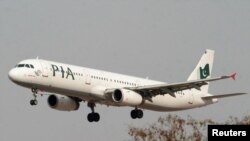Pakistan said Tuesday an ongoing investigation into “dubious” commercial pilot licenses has led to the dismissal of 28 pilots working for the national airline.
The move followed government revelations nearly two weeks ago that 262 out of 860 active pilots in the country working with state-run Pakistan Internal Airlines (PIA) and domestic, as well as foreign, commercial companies had improperly gotten their licenses.
“Twenty-eight pilots, whose licenses were found suspect and against whom disciplinary proceedings were completed, have been dismissed from service,” Information Minister Shibli Faraz told a news conference in Islamabad.
He said that “disciplinary” and “criminal” proceedings are continuing against the remaining pilots.
“Those whose licenses were found suspect in the inquiry have all been grounded. All others are cleared,” the minister noted.
Faraz was speaking after attending a cabinet meeting chaired by Prime Minister Imran Khan.
Faraz did not share more details, but PIA officials announced shortly after the scandal came to light that they were immediately grounding about 150 out of 426 pilots, pending further investigations against them.
A spokesman for the state operator explained at the time that the 262 pilots in question were associated with PIA and other domestic and foreign companies.
Industrywide problem
“PIA acknowledges that fake licenses (are) not just a PIA issue but spread across the entire Pakistani airline industry,” the spokesman said.
Faraz said Tuesday that legal action had also been initiated against officials at PIA and the Civil Aviation Authority (CAA), who were responsible for issuing fake licenses.
He stressed that international and domestic stakeholders have been informed of Pakistan's actions resulting from the investigations.
Global safety and transport bodies were quick to express concern about the “dubious” Pakistani pilot licenses.
Barred from European Union
Last week, the European Union Aviation Safety Agency (EASA) announced that it was barring PIA from flying into most of Europe for the next six months. It cited concerns about “the validity of the Pakistani pilot licenses and that Pakistan, as the state of operator, is currently not capable to certify and oversee its operators and aircraft in accordance with applicable international standards.”
Countries such as Malaysia and Vietnam, where airlines had employed Pakistani pilots, have also grounded the pilots over the fake license concerns.
The scandal came to light during investigations into the May 22 Airbus A320 plane crash at Pakistan’s southern port of Karachi in which 97 people were killed.
Further inquiries eventually led investigators to find that the CAA had given out licenses to pilots who had cheated on their exams.
Actions praised
Critics, however, have praised Khan’s government for publicizing details of the inquiry, saying the unprecedented move has paved the way for carrying out long-overdue reforms to end years of corruption, nepotism and political interferences plaguing CAA and PIA, inflicting massive losses on the national airline.
Faraz said that all “the suspect licenses” were issued between 2010 and 2018 when the country’s two main political forces – the Pakistan Peoples Party and the Pakistan Muslim League-N – were in power respectively.
“It is evident that they corrupted the system to do so,” Faraz said.
Both of the parties, which currently form a major chunk of the opposition in Parliament, have rejected the allegations and instead criticized the government for mishandling the issue and undermining the already crisis-ridden PIA.
Khan defended his actions, saying even his cabinet members had pressured him not to make the details public to save both the airline and Pakistan from major international embarrassment.
“If I know there are pilots (in PIA) with fake licenses and I don’t take action, and so many people get killed in a plane crash, obviously their blood will be on my hands because I am the prime minister,” Khan lamented.




